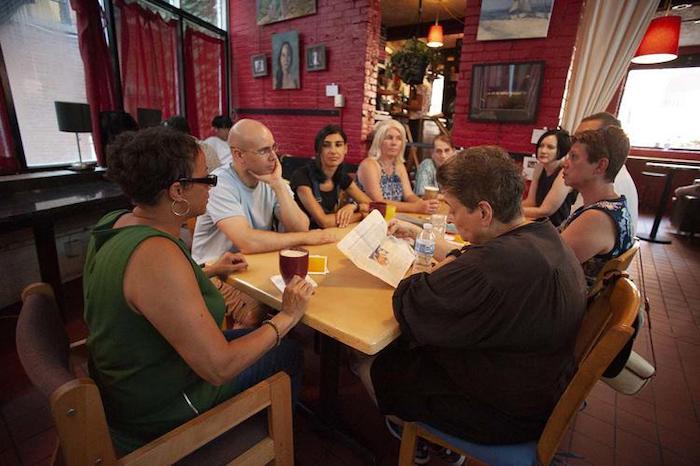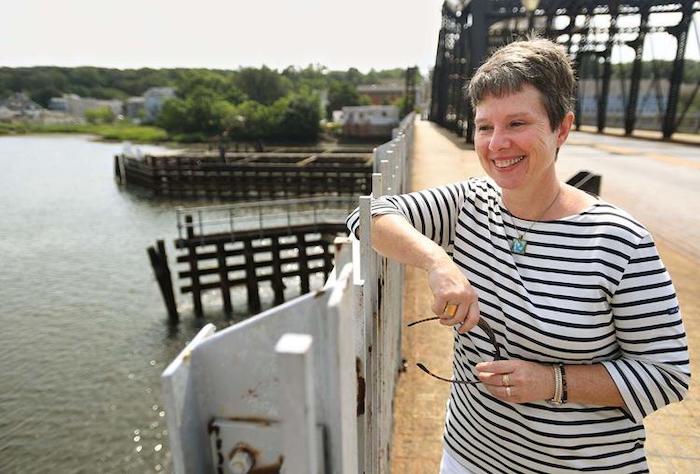
By Cara McDonough
The term “death doula,” which a lot of people use when describing Nathalie Bonafé, makes her job sound edgy. But the proper name for what Bonafé and her company A Gentler Parting do is “end-of-life doula.” And while the job does involve helping individuals and their caregivers face the existential mysteries of the great unknown, end-of-life doulas spend a lot of time facilitating the practical duties that surround the event.
These doulas — who, like birth doulas, are focused on ushering individuals from one phase of life to the next — aren’t as common as the hospice and palliative care workers we associate with end-of-life care. However, they hope their work, approaching death with compassion but also a pragmatic business sensibility, will become more mainstream.
In fact, Bonafé and her colleagues refer to what they do as “a movement.” In addition to their primary responsibilities, they also conduct free workshops, seminars and discussions known as “Death Cafes” to get people talking about death more often, making it a less taboo topic.
Bonafé, previously a molecular biologist, was trained at the New York City-based International Doulagivers Institute. While end-of-life doulas do not provide medical care, she and other doulas offer a wide range of services: Bonafé can help a client do anything from write a living will to downsize his or her home. After a client has passed, she can help create “legacy projects” and facilitates grief management. Rates vary greatly from client to client, she says (most end-of-life doulas seem to average several hundred dollars for typical services).
While the actual client might be the individual facing death, an end-of-life doula can prove invaluable to that person’s family, health care team and legal counsel, too, Bonafé says. The doula serves as an unaffiliated advocate during an “emotionally charged” period, she says, providing crucial support and planning.
Ingrid Harrison of Affordable Personal Services & Pet Care is a former veterinary technician and New Haven County-based end-of-life doula who specializes in keeping clients with their pets.
“I have seen firsthand with my clients, family members and friends that if there is no plan when you become debilitated or pass away, it can have a disastrous outcome,” she says. “Having an end-of-life doula makes for the peaceful passing that everyone deserves.”
As for the Death Cafes? Again, sounds edgy, although the concept is anything but. Bonafé holds them on the last Tuesday of every month at New Haven-based coffee shop Koffee?, describing the gathering in flyers as “a safe, respectful space where we can share our beliefs, curiosity, fears, and stories — and maybe gain a little insight into our mortality.”

End-of-life doula Nathalie Bonafe helps families and individuals deal with the death process, from grief management and emotional support to document organization.
There are usually about 10 participants at each meeting, of different ages and from diverse cultural backgrounds, ethnicities and religious beliefs, she says. One young man joined a recent group after he’d finished a date at the coffee shop because he had recently attended his first funeral and wanted to share thoughts.
People hear about the events through word of mouth, social media or the official Death Cafe website deathcafe.com, which includes events all over the world; there are over 8,800 Death Cafes held in 65 countries, according to the site.
“People leave the meetings with big smiles and a heart full of joy to have been able to share their stories,” Bonafé says. “As the moderator, I ensure that the space is a place of respect and lack of judgment.”
Dawn Whelan operates My Last Gift in Staffordville. Her services, in addition to many like those provided by fellow end-of-life doulas, also include destroying paperwork “not intended for public view” after a client has died.
She says that death is the “one thing we all have in common” and is honored to serve her clients and the community through her work and the free monthly webinar she’s created — DASH — allowing individuals to discuss death openly on a regular basis.
Whether at “cafes” or online, discussing death can help dissuade fearfulness, says Sharon McCullough, an end-of-life doula based in Southington. Her company, Sharon Cares, also offers free discussions on death at a local wellness center.
“People live as if they will recover from all diseases and incidents and are angered by anyone who even starts to talk about the idea that treatment is not curative. This leaves many families stricken with anger when a loved one dies,” she says. “As a doula, I am able to be a witness and support through the struggles of this very natural part of life.”
Dr. Kathleen Leinhardt, a physician who treated one of Bonafé’s clients, saw firsthand how the emotional and logistical support offered — providing food, music and companionship, while also helping organizing home health care and hospice services — changed her patient’s experience. “Nathalie truly took on the role of a surrogate daughter,” she says. “End-of-life doulas can be an invaluable help to those who lack family or whose family lives far away. More than that, though, they can serve as a guide to both patient and family through the emotional and logistical process of dying.”
Nathalie Bonafé shares what she’s learned as an end-of-life doula.
Everyone has a story.
When I spend time with people toward the end of their lives, I am always amazed by the stories they share with me: what/who really mattered to them, where they grew up, their relationships, places they called home, visited, loved, their daily activities, their passions, their beliefs. I find that many express their grace and humanity alongside their vulnerability.
Everyone wants validation.
People want to be seen, heard and understood. No matter what religion, beliefs, education, socio-economic status, mental or physical abilities people have, everyone I encounter is receptive to a smile, compliments or being listened to. People at the end of life want to be witnessed and remembered as the young and strong and able people they used to be. They also want to be remembered as loved, decent, loving human beings, without judgment.
People tend to die the same way they chose to live.
People have a lot more control over the way they die than one can imagine. For instance, a very private person will prefer to spend the very last instants alone or in the arms of a very trusted person; a person who was a natural caregiver will die making sure that the most sensitive/fragile people in their lives are sheltered from shock and pain. Likewise, those who understand the benefits of planning a little, and learn the notion of “letting go” during their lives, tend to find acceptance and inner peace more easily than most.
Listening is more powerful than speaking.
Compassion, understanding, forgiveness and love can be expressed very simply. Similar to the way a frightened child will find incredible comfort and reassurance in your open arms, people in grief, whether facing their own mortality or that of a loved one, want a safe, intimate space to shroud their pain and fears. Learning to build and offer such a space to others in need of such reassurance has been one of the most sacred, humbling and profound discoveries of my life.
It’s worth living to learn.
Life is hard. Every day, we get disappointed, we either feel hurt, or we hurt, we misunderstand, we get angry, we win sometimes, yet we fail a lot more often than we win. Still, we learn throughout it all. Think about it this way: since it is scientifically proven that novel experiences give us a rush of dopamine, the “feel good” neurotransmitter, we can turn the pain and changes in life into growth and love and more rushes of dopamine. Intense moments of joy and excitement are rare. Pay attention and enjoy them; they are precious.
Complete Article ↪HERE↩!
